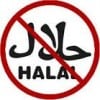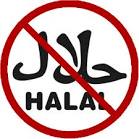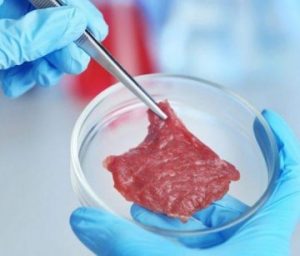Across Fortress Europe, the ramparts are being fortified against halal and kosher slaughter.
 The Muslim and Jewish “barbarians” are allegedly at the gates – again – with their “ritual” slaughter knives.
The Muslim and Jewish “barbarians” are allegedly at the gates – again – with their “ritual” slaughter knives.
Across Fortress Europe, the ramparts are being fortified against halal and kosher slaughter – now proscribed in at least 11 European states.
Last week, Greece’s highest administrative court ruled to forbid kosher and halal animal killing, by requiring stunning before slaughter. (Jewish and many Muslim legal scholars interpret stunning as incompatible with Biblical and Quranic stipulations that animals be uninjured at the time of death.)
In September, it was the Belgian Constitutional Court, which upheld legislation precluding non-stun kosher and halal slaughter in two out of the country’s three regions.
Both decisions followed a December 2020 judgement from the European Court of Justice permitting states to prohibit halal and kosher slaughter – although the killing of animals for sport or “cultural events” continues to be excluded from the stunning requirement.
In previous centuries of European Christendom, kosher and halal slaughter was condemned as a sign of the practitioners’ “blood lust” or, under the Spanish Inquisition, as evidence of the “impurity of blood”: part of the arsenal of rationalisations for the recurrent pogroms, torture, and expulsions staining Europe’s own slate. Now, courts, politicians and governments deploy the seemingly bloodless language of “animal welfare” instead.
Right-wing Belgian regional Animal Welfare Minister Ben Weyts, for instance, lectures Jews and Muslims about the incompatibility of their “outdated” traditions with “civilised society” – even while overseeing the expansion of mass animal killing in the slaughterhouses of the “civilised.”
Just earlier this year, Tielt slaughterhouse in Weyt’s region of Flanders was approved to significantly increase its “output” – from 1.5 million pigs killed per year to 2.3 million – despite video footage from 2017 showing animals being knifed, scalded, and drowned while fully conscious, as well as beaten, kicked, and dragged by chains.
For “infringements on animal welfare” the slaughterhouse was fined 16,000 euros ($18,500): a mere .01 percent of its annual revenue. More recent undercover recordings from Tielt by animal rights organisations showed pigs being kept in metal containers at such hot temperatures that they were foaming at the mouth, even after the installation of official camera monitoring.
Due to the relative permissiveness of its environmental regulations, Belgium has served as a haven for the relocation of factory farms from the Netherlands – where the export of halal and kosher meat has been banned since 2018, while the export of factory farming and its products of suffering continues to lucratively flow.
Documents disclosed from the Netherlands Food and Product Safety Authority reported instances of pigs and calves being boiled and skinned alive in Dutch slaughterhouses: abuses deemed insufficient to result in the closure of the slaughterhouses involved.
Farmed animals are so frequently immolated en masse in barn fires or suffocated in their own manure that there are entire categories dedicated to these modes of death in the archive compiled by Belgian and Dutch NGO Animal Rights.
Elsewhere in Europe, French ministers bemoan the “separatism” of halal and kosher aisles in the grocery store, while local governments impel assimilation by coercing French schoolchildren to eat pork – the product of a porcine agriculture industrial complex pervaded with abuse (such as the killing of weak piglets by slamming them onto a concrete floor).
And in Denmark, the state has outlawed the figment menace of non-stun kosher and halal slaughter – a practice that was already non-existent in the county, according to the government’s own records. Meanwhile, the Danish government recently mandated the mass preemptive pandemic “culling” of farmed minks by the millions. This is usually performed by carbon monoxide gassing, a particularly painful and prolonged form of death for semi-aquatic animals such as minks who can survive for long periods of time without air.
Three times as many European countries have enacted bans on halal and kosher slaughter as have prohibited or pledged to prohibit maceration: the widespread practice of grinding up s live un-stunned male chicks, who are treated as extraneous “waste” in the production of eggs. Far from being generally illegal, maceration by an “apparatus [with] rapidly rotating mechanically operated killing blades” is prescribed as a standard procedure by EU regulations on the “protection of animals at the time of the the killing,” for “chicks up to 72 hours” old.
Europe’s enduring kosher and halal obsession is an exercise not simply in double standards, but in dissociation: externalising onto Jewish and Muslim “others” the seething substratum of violence that sustains itself. As with other popular image-laundering tactics – pink-washing, green-washing – fur-washing portrays the victims of colonial modernity (in this case, non-human animals) as the beneficiaries of its “humanitarian” largesse.
The fixation on stunning as the guarantor of a good death obscures the brutality endemic at all stages of a farmed animal’s life, including in the very act of stunning itself.
For cows, there is “captive bolt stunning” – the firing of a bolt into the slaughter subject’s brain, in some cases requiring repeated shots. For pigs, carbon dioxide immersion – causing pigs to gasp, panic, and attempt to escape, as concentrated carbon dioxide turns into acid upon contact with wet eyes and lungs. For chickens, “inverted shackling” and “electrical water-bath” – in which birds are hung upside-down by metal shackles, collapsing their hearts and lungs and sometimes ripping off their feet, and then electrocuted.
When stunning fails, animals go through the subsequent stages of the slaughter process, throat-slitting and scalding, while still conscious. A 2016 study measuring stunning efficiency found that one-eighth of cows were ineffectively stunned – far greater than the proportion denied prior stunning due to halal and kosher rules in countries like Belgium.
One impediment to assessing stunning in some slaughterhouses, the study noted, was the “thick layer of blood [covering the floor] to the extent that it was too dangerous for staff to walk on the surface”: violence creating the conditions to ensure its own unaccountability.
Stunning by carbon dioxide and water-bath electrocution are both authorised by the EU’s animal protection regulations – even though widely criticised as cruel – explicitly for reasons of “economic viability”. So much for the regulations’ stated objective of eliminating all “avoidable” pain, suffering, and distress – at least when the elimination of pain conflicts with the imperative of capitalist gain.
Ultimately, in Europe, almost one-quarter of the “meat” generated by this supposedly necessary suffering ends up being discarded as garbage. The global wastage of animal lives has further intensified during the pandemic, with millions killed off not for food, but simply to relieve the pressure on glutted production lines. In the US, this has involved methods such as “ventilation shut-down,” a euphemism for the slow roasting to death of live animals confined in barns with the airways sealed off.
“The very law that prohibit[s] some types of violence also authorize[s] others,” as legal scholar Samera Esmeir observed in Juridical Humanity: A Colonial History – which traces how European colonisers exalted their own humanity by purporting to inculcate humane behaviour in the colonised.
Then as now, professions of humanitarianism coincided with the extension of domination. Colonial powers castigated and criminalised the animal cruelty of the “uncivilised,” while escalating their own (ab)uses of colonised animals – human and other-than-human – for various “civilised” ends.
For instance, a staggering 60,000 camels were worked to death, killed, or lost in the first year of Britain’s second invasion of Afghanistan alone, in 1878. Grossly exploited in life and abandoned to rot in death, they are now posthumously “honoured” in a Hyde Park memorial alongside other animal casualties of Britain’s wars as having died “in the cause of human freedom”.
Colonial officials such as Lord Cromer, Britain’s consul-general in Egypt, were not only archetypes of imperial feminism – Cromer infamously undertook to “liberate” Egyptian women from Islam yet headed the League for Opposing Women’s Suffrage at home in the UK – but also promoted imperial animal welfarism.
A founding patron of the Society for Prevention of Cruelty to Animals in Egypt, Cromer went on to serve as president of the UK Research Defence Society, which was dedicated to defending often-cruel experimentation on live animals as a “humanitarian” enterprise; for example, testing gas poisoning on monkeys, or researching gunshot wounds by shooting dogs in the head. Similar types of experiments continue to be conducted in the context of the “war on terror” today.
Perpetually, colonial logic finds ways to define its own violence as virtuous; its casualties – whether of the drone attack or the butcher’s knife – written off as “collateral damage” in the advance of justice, reason, freedom, and humanity. “Their” violence is excessive and therefore barbaric; “ours” is not only necessary but benevolent.
The manipulative invocations of animal welfare reached a horrific apotheosis within Europe with the Nazi regime – which professed to protect animals from Jewish cruelty, including banning kosher slaughter in 1933, while simultaneously representing Jewish people as pigs, monkeys, leeches, rats, and other so-called “vermin” to be exterminated. (A centuries-old anti-Semitic tradition that endures at events like the Aalst parade in Belgium, where caricatured Jews have been portrayed in recent years as ants.)
“We Germans, who are the only people in the world who have a decent attitude towards animals, will also assume a decent attitude towards these human animals,” is how Holocaust architect Heinrich Himmler described the massacre of Jewish people in concentration camps – grotesquely, as a “humane” genocide.
From Auschwitz to Abu Ghraib, being “treated like an animal” for humans has meant being subjected to death and torture without restraint: a sign of how pervasively the damnation of non-human animals has been inscribed as the norm, despite the proclamations of human decency and empathy.
Public intellectuals applaud the human world for becoming steadily less violent; forget that the killing of farmed animals has increased 10-fold over the last 60 years alone, now progressively hidden by the “higher-welfare” and “cruelty-free” mirage – repeatedly exposed as often little more than a placatory illusion, behind which extreme abuse persists unchecked.
The “humane” treatment of animals is hailed as the pinnacle of human selflessness; never mind that even the most marginal improvements – a slightly bigger cage, a slightly less traumatic death – are regularly justified in terms of human-centric benefits to meat quality, production efficiency, and marketability. Once again, non-humans’ most basic interests are rendered secondary and subservient to human wants.
In contrast to this self-serving and self-congratulatory humanitarianism – premised on continuing domination with (perhaps) somewhat mitigated brutalisation – scholars of subjugated traditions are recovering other possibilities for justice and liberation.
Sarra Tlili’s book Animals in the Qur’an, for example, explicates the Quranic image of non-human animals not as interchangeable commodities but as individual, spiritual beings; intertwined in relationships of mutual inter-dependence with other animals, including humans; with their own experiences and perspectives that humans are obliged to respect. It is a beautiful and profound challenge to dominant ways of understanding what it means to be an animal – human or other-than-human – in this world.
As for Belgium’s halal and kosher slaughter ban – Muslim organisations have said that they plan to challenge it at the European Court of Human Rights. Yet a deeper justice would be to reject colonial modernity’s exploitative and exclusionary concept of “the human” altogether: the ideological vehicle for long histories of violence against “dehumanised” humans and non-human animals alike.
The views expressed in this article are the author’s own and do not necessarily reflect Al Jazeera’s editorial stance.



